Hi everyone!
Buy your coffee as whole beans, is probably the most ubiquitous advice you get when you get in to brewing coffee. I fully agree with this, and this should at highest priority if you want good coffee at home.
When you come to actually buying high quality whole coffee beans, online shopping usually is the most convenient and reliable way to do it. I myself pretty much purely rely on online shopping for my beans. (Especially with the COVID situation, this would be the most sensible option)
However there is a difficulty with online shopping, which is shipping cost. If you want high quality coffee, you need to buy it directly from roasters who know what they are doing. You may get free shipping from Amazon, but I am quite sure you will not be able to get fresh high quality coffee beans from Amazon.
The roaster may offer discounted shipping if you but more beans. So naturally you want to take advantage of that, but now the problem becomes how do you store these beans freshly. I am sure you have had the same problem as well.
So I would like to share my coffee bean storage strategy.
The strategy
The keys point is to store the coffee beans in 2 separate batches.
- Short term use : The amount I plan to use in 2weeks (about 200g, for me)
- Long term storage : The rest which I want to store long term
For the short term use batch, I put these in an air tight container and store it in a dark cabinet at room temperature.
Personally I think the container can be anything if it’s air tight. I currently use a glass container from IKEA, just because I had some around at my house. I believe it is the IKEA365+ glass container.
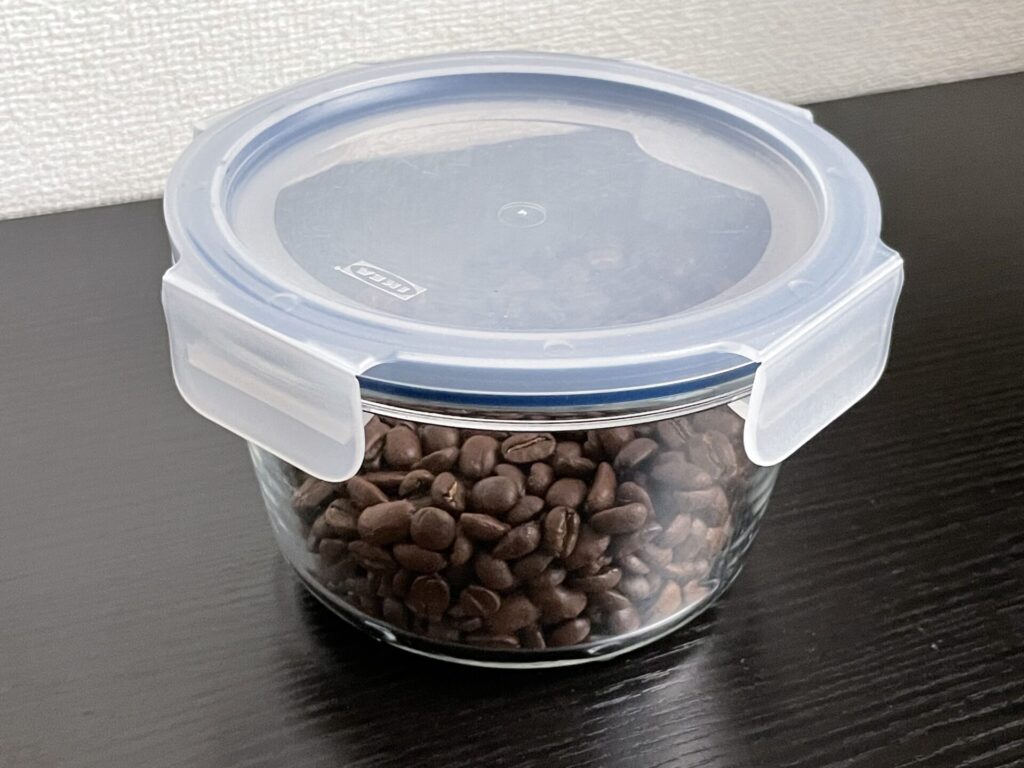
For the long term storage batch, I would leave them in the original bag that they came in, throw that in to another air tight ziplock bag, and store them in the freezer.
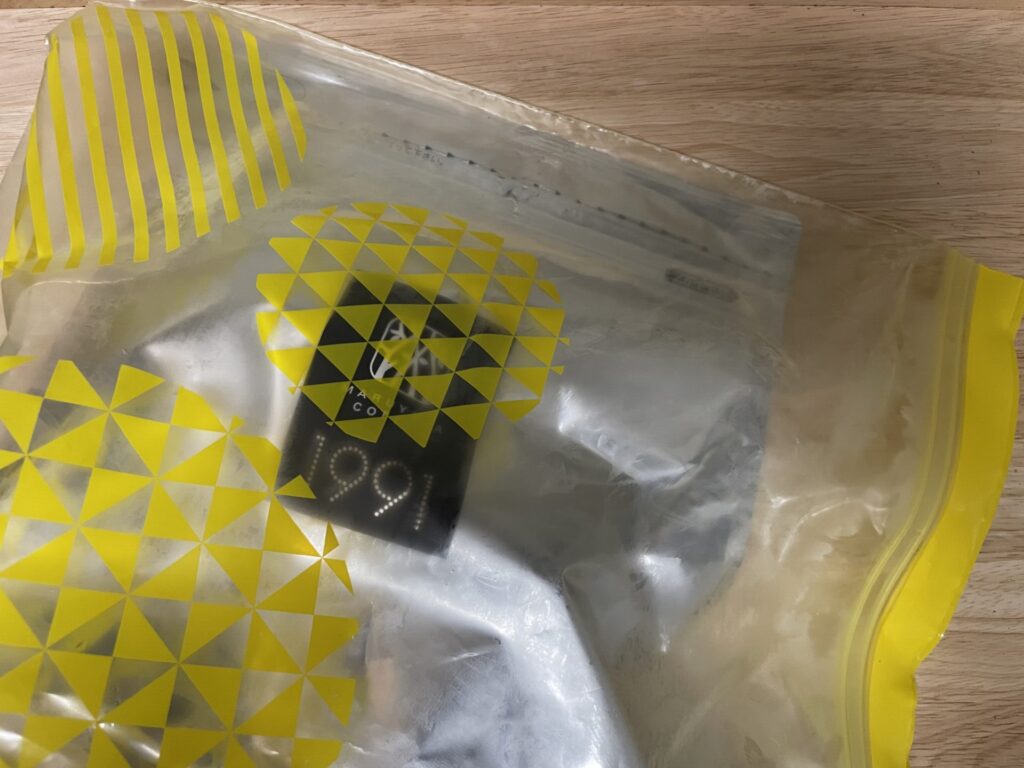
When I need to take some beans out of storage, I would take the bag out and leave them overnight at room temperature WITHOUT opening the bags. Once the beans are back to room temperature, I can open the bags and get some out. If I have some left over, I would reseal the bags and re-freeze them. (Re-freezing doesn’t sound so nice, but from my testing they had no negative effect)
Explainations
Let me explain why I do what I do in my strategy.
First of all, degradation of coffee beans is in large part due to;
- Oxidation of the beans which is accelerated by light, moisture and temperature
- Volatile substances (like aroma) leaving the bean
So if you freeze your beans, it will greatly reduce the rate of oxidation by cutting out light and temperature. The volatility of substances reduces at low temperature as well, so it also acts to keep the aromas in the coffee beans for longer.
The reason I put the beans in an air tight bag for freezing is to avoid condensation on the beans. Condensation happening on the beans will make the beans wet, which is a very undesirable for storage. This is why I need to bring the frozen beans back to room temperature before I open the air tight bag.
Another reason for the extra bag is to prevent smells from other things in my freezer to contaminate the beans and vise-versa. Typical coffee bean bags come with a vent hole. This is to release the CO2 coming out of the freshly roasted beans to prevent the bags bursting. This is a very nice and necessary feature, but it does mean that the original bags are not air tight. This is why I put the original bag in an air tight bag.
You may have wondered, why not store all your beans in the freezer?
The key reason is condensation. As I mentioned above, you need to avoid moisture on your beans. Having condensation on your frozen beans is like dumping your beans in water.
If you have all your beans froze, it takes too much time to bring them back to room temperature every time you want to make coffee. I suppose you could separate your beans in to single dose quantity bags, but thats just too much work, and waste.
For another, I do not want to brew coffee with frozen beans. I have not experimented with this (maybe I will, one of these days), so this is an estimate. If you have cold grounds, naturally when you pour hot water on to them, it will take away heat from the brew. This will cause your brew temperature to be off of where you would want it to be. Although, having said this, maybe you could compensate for it by using sightly hotter water.
Another less obvious reason is, frozen beans may lead to more fines when grinding them. I do not have the evidence for this, but frozen beans would seem to be harder and more brittle. If they tend to shatter more violently than room temperature beans, it could lead to more fines being produced.
By the way, I have heard of vacuum containers for coffee beans. I personally have not tried them out so I do not know how they are. But my impression is that it might be annoying to pump out the air every time I brew coffee.
Does freezing beans actually work?
For the final section, I would like to provide some evidence that freezing your beans does help to keep them fresh.
I compared beans stored in the following two conditions. I bought a 500g bag. Both samples came from the exact same bag, and they have been stored for 3 weeks.
- Short term use batch : put 200g in the air tight container, which was stored in room temperature in a dark cabinet. It was opened daily.
- Long term storage batch : kept the remaining 300g in the original bag, put that in another air tight bag and stored it in the freezer. I got them out of the freezer last night and brought them back to room temperature before comparing.
First, some visual comparisons.
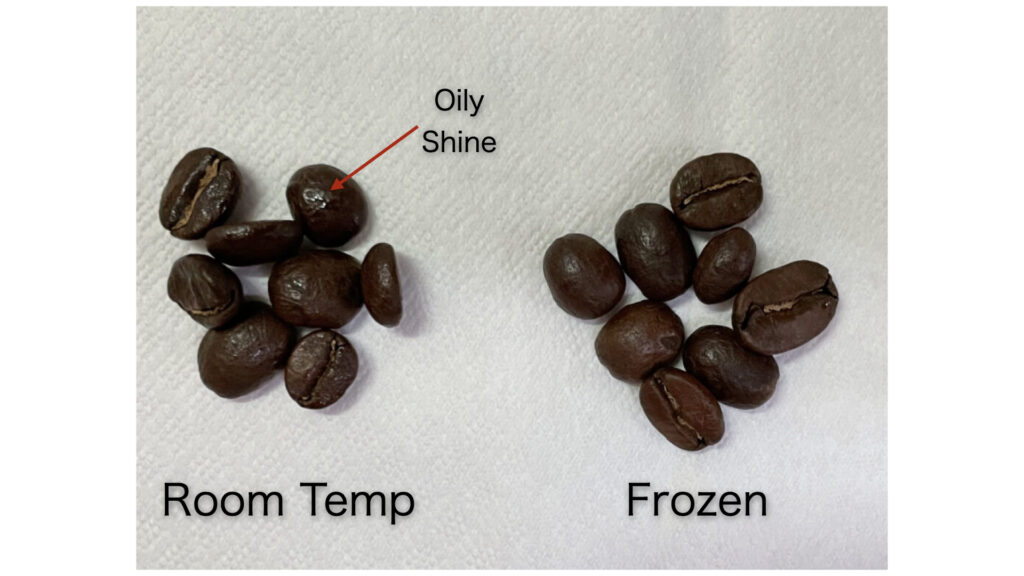
They are both from the same bag of coffee beans, so obviously they look very alike. But if you look closely, the beans stored in room temperature have some oil on the surface making parts of it shine. In comparison, you can see that the frozen beans are more matte. This oil appearing on the beans is caused by the gasses in the bean trying to leave. As the gas leaves, it pushes along the oil contained with in the bean and brings them to the surface.
From this you can observe that freezing was able to prevent volatile substances from leaving the bean. Also, one thing to note is that freezing has not had any visible damage to the beans.
Let’s try grinding them now.
After grinding both samples with the same grinder at the same setting, visually they look identical. I could be biased here, but I did feel that the aromas being released from the frozen beans was stronger.
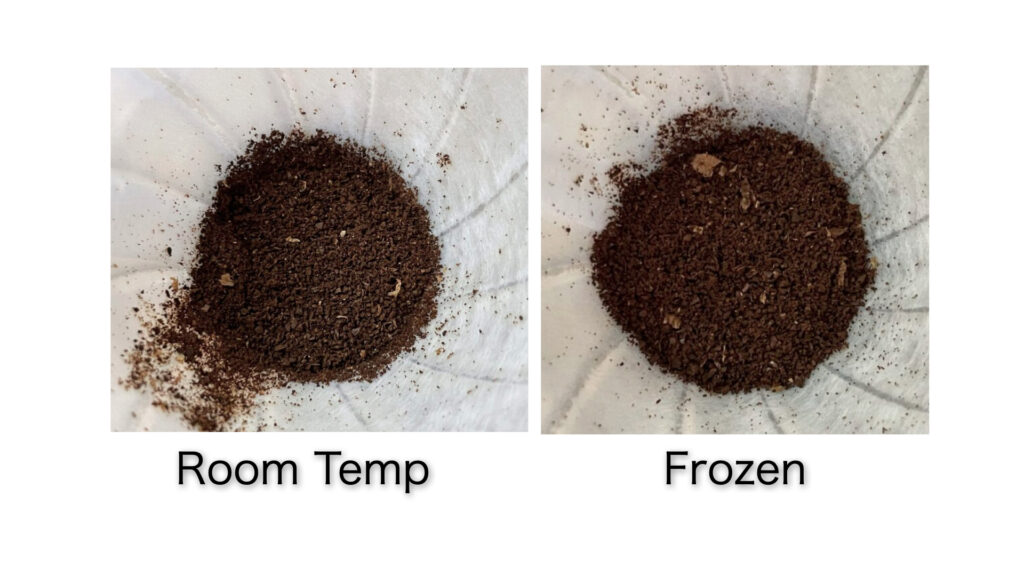
Next I compared their blooms. I poured the same amount of 90℃ water on them. Here there is a clear difference. The room temp beans where pretty flat and did not release too much gas, on the other hand the frozen beans let off quite a lot of gas.
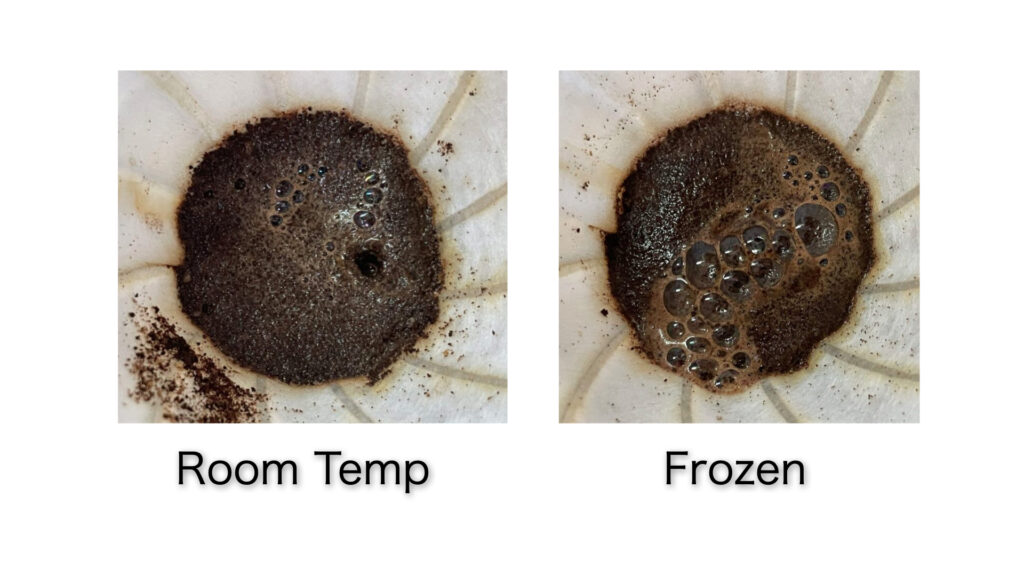
And finally, the taste comparison.
I tried to keep by brew technique as identical as possible. There was a clear difference in the taste. The beans stored in room temperature did have this oxidized kind of acidity, where as the frozen one was more balanced and a far better cup.
It’s difficult to notice when you are drinking a cup every day as the beans degrade, but when I compared them side to side, it was very evident that freshness is very important.
To be honest, the experiment that I really would like to do is to compare freshly roasted beans to ones stored in the freezer. But this experiment is rather difficult to set up, since the beans will come from different roast batches which will affect their tastes.
Hope this strategy and comparison was interesting and informative to you.
How do you store your coffee beans? Do you have a better strategy? I would love to hear from you in the comments!


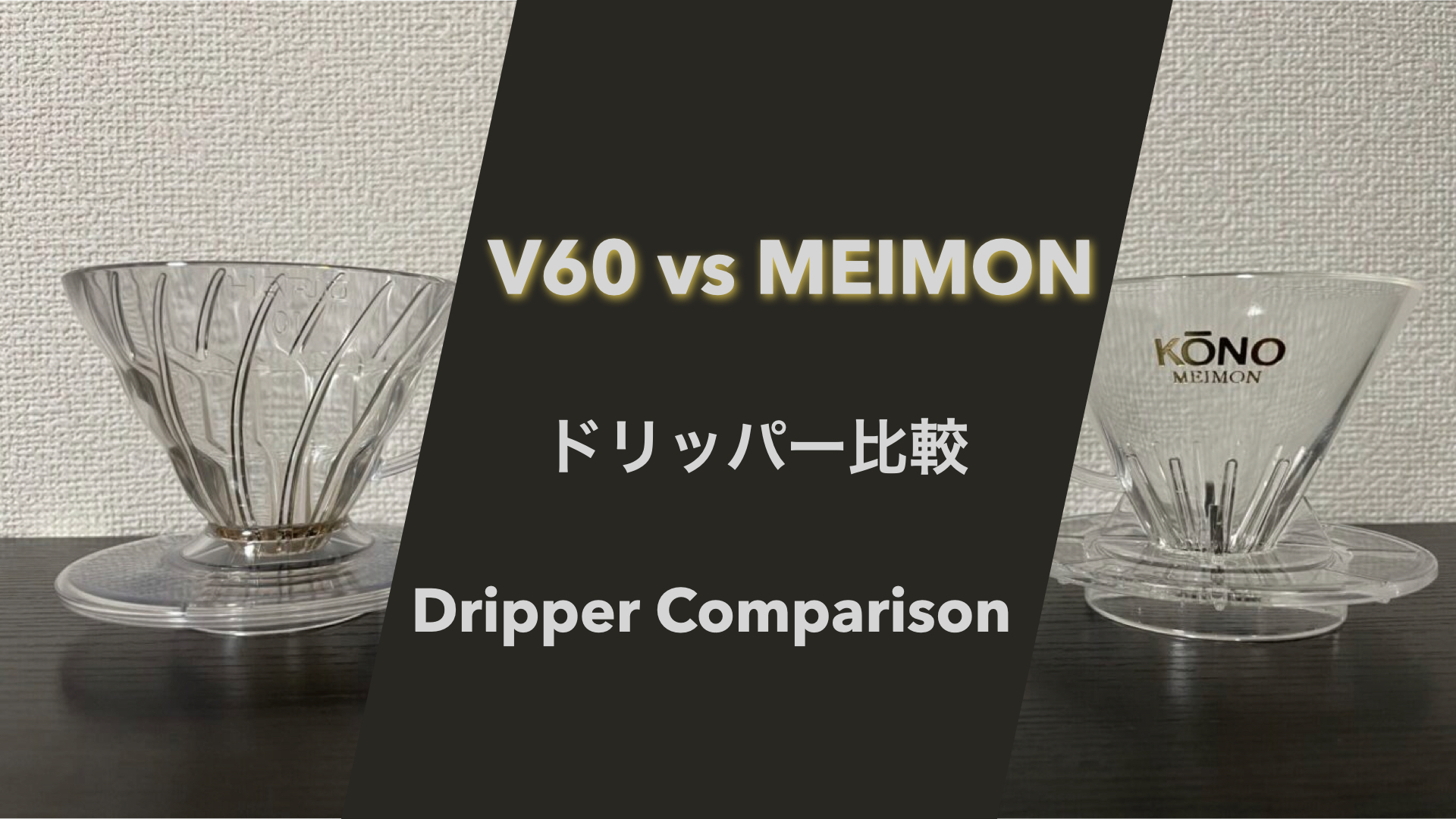

コメント